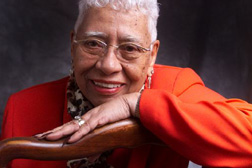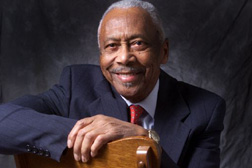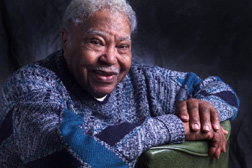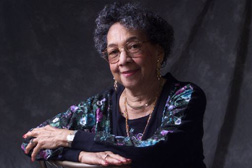 Yvonne Walker-Taylor: `I
liked school because I was an only child and going to school was just my piece
of cake.' Yvonne Walker-Taylor: `I
liked school because I was an only child and going to school was just my piece
of cake.' |  George Cooper: `The realization of racism came
on me in a gradual way. I think it came on most kids in a gradual way, both
white and black.'
George Cooper: `The realization of racism came
on me in a gradual way. I think it came on most kids in a gradual way, both
white and black.' |
 Ned Wood: `In the Depression, life sure changed.
We lost our farm in 1931. One year, we had boll weevils.'
Ned Wood: `In the Depression, life sure changed.
We lost our farm in 1931. One year, we had boll weevils.' |  Ellen Lee Jackson: `Dayton
was a prejudiced place. As far as the jobs were, you didn't get to have the
good jobs like they have now.' Ellen Lee Jackson: `Dayton
was a prejudiced place. As far as the jobs were, you didn't get to have the
good jobs like they have now.' |
Spoken history
A rich treasure is found in the words of our elders
By John Keilman DAYTON DAILY NEWS
A rich treasure is found in the words of our elders
VOICES OF HISTORY - FIRST OF 5 PARTS
Published: Sunday, February 14, 1999 ; Edition: CITY ; Section: NEWS ; Page: 1A .
"The Navy sent me back to Hampton, (Va.), where I became personnel officer. I was the only black man within 500 miles in a naval officer's uniform ... And a goodly number of those sailors just didn't want it to happen, as evidenced by this young man who walked up in front of my face in Newport News one day, my wife and my daughter to my side, put his fingers to my face and said,`You black son of a ... I never thought I'd see one of you, and I hope I never see another one."
- Centerville resident George Cooper, 82
There was a time, not so long ago, when many black Americans were discouraged
or flat-out prevented from reading and writing. When they died, they left
behind no diaries or letters, no written accounts of their daily lives.
But they did leave stories.
Oral history, spoken memories passed through generations, left a powerful legacy among blacks even after literacy became widespread. It has produced the chronicles that never made it into textbooks, recollections that form an identity.In acknowledgment of that tradition, the Dayton Daily News is presenting the stories of four black octogenarians, told in their own words. Over the next four days, they will share their remembrances of the Depression, World War II and the civil rights movement, as well as the quiet setbacks and victories of everyday life.
The series follows Centerville resident George Cooper, 82; Jefferson Twp.'s Ellen Lee Jackson, 87; Yvonne Walker-Taylor, an 82-year-old Wilberforce resident; and Ned Wood, 85, of Dayton.
Cooper and Wood grew up in humble surroundings in the rigidly segregated South. Walker-Taylor, the child of a minister, was reared in middle-class comfort. Jackson spent much of her childhood and later life in West Dayton.
"I think it's a wonderful thing to tell of your heritage, where you were born and how you came along," said Jackson. "I think it's nice to let people know, because a lot of children now, they don't realize how things were back in those days."
Such personal tales have become a field of intense interest among historians and other academics, who realize that immense chunks of the past have yet to be unearthed. These missing pieces can't be found in a library or a computer database. This history lives only in people's minds.
`So much of history doesn't tell the real story,' said Sue Taylor, an assistant professor of anthropology at Howard University who has recorded oral histories since the 1970s. `I think it's extremely important to collect all that information before the people are gone.'
Most cultures depend on memory to preserve their pasts, but few have found it more vital than black Americans.
Slaves frequently were not permitted to learn to read or write. Teaching them could be against the law. Even after emancipation, discriminatory laws often kept segregated black schools in a dismal state, if they existed at all.
`You couldn't write, nor could you read in most cases. You were forbidden to do that,' said Marlese Durr, assistant professor of sociology at Wright State University. `The only way stories could be passed down was orally. In retelling that story, you can remember every nuance, every name.'
In some cases, oral history sustained tales that many wanted to forget.
For nearly 200 years, it was common wisdom among blacks that Thomas Jefferson fathered children with his slave, Sally Hemings. Most historians, depending heavily on written records, rejected that belief.
But last year genetic tests linked Jefferson with a descendent of Hemings. The oral account, many converts now believe, was true.
The case, however, also highlighted the weaknesses of oral history. While the tests strengthened the account of Jefferson's relationship with his slave, they also refuted one black family's long-held claim that they were kin to the president.
Yet overall, Durr said, academics are confident of the accuracy of oral history.
`They think it's pretty accurate, because some of the key things are still there, such as names and dates,' she said. "There are usually two or three storytellers, so people can authenticate it because the details are similar.'
Recording the oral history of older relatives gained new popularity after the 1977 television series, Roots, the exploration of a black family's journey from slavery to freedom. It remains a favorite tool among the history-minded in the Miami Valley.
During the mid-1990s, Cityfolk, a traditional arts and music organization, conceived the Dayton Stories Project, in which 1,200 people gathered in small clusters to share accounts of their lives.
`The two groups that we focused on were the Appalachian and African-American communities initially,' said Marilyn Shannon, who headed the project. `There are a lot of similarities between those two communities. One is the oral tradition of passing down knowledge through storytelling rather than written means.'
In 1997, Annie Bonaparte of the Innerwest Community Development Corp. began an oral history project among the teen-agers and seniors of West Dayton. It continues today.
Bonaparte said the teens ask their elders about their lives, discussing everything from their relationships with their parents to the types of clothes they wore. The answers, she said, satisfy more than curiosity.
`It's about who they are, where they came from, pride and dignity, and teaching our kids to remember,' Bonaparte said. `It's about respect. It's about all of those things we say we want our kids to know.'
Today's interviews: Living through changes
|
CONTACT John Keilman at 937-225-2362; or e-mail him at
john_keilman@coxohio.com
|
